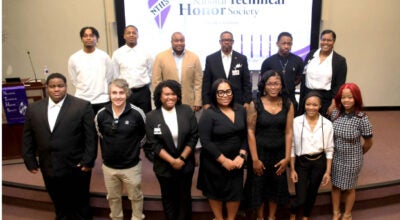Attorney registry: A growing piece of history
Published 12:15 pm Sunday, February 16, 2014
On a windy Tuesday morning late last month, Amelia McGowan — one of Vicksburg’s newest attorneys — inked her name into a antebellum relic of Warren County history.
McGowan is the latest lawyer to sign the thin, leather bound book known as the Warren County attorney registry, a veritable living piece of history with signatures dating back to before the Civil War, said Circuit Judge M. James Chaney who was presiding in court when she added her name.
“It’s a tradition we like to carry on,” said Chaney who signed the book in 1977. “I don’t know that anybody still does it.”
The book has been maintained by the Circuit Clerk’s office for more than 150 years and contains basic information about several generations of attorneys who brought their practice to Warren County.
Information filling the book’s aging pages is scant — name, age, alma mater, bar admission date and remarks — but the brief writings tells the histories of entire families, early community leaders and the ever-changing legal profession.
The first signature in the registry is illegible, though information next to the name indicates the attorney was a Virginia native who was admitted to bar there in 1834 and to the local bar in 1835.
It is also unclear why the 1830s were chosen to start the registry.
Edward Turner, the first attorney to live to Warren County, moved here 25 years before the first recorded date in the registry. The first incarnation of a statewide bar association began in 1821 but disbanded in 1825, 10 years before the date of the earliest signature. The organization was not formed again until the 1880s.
For whatever reason, the book was begun then, and though it is missing signatures of famous early attorneys such as Jefferson Davis, Joseph Davis and Seargent Smith Prentiss, it contains a wealth of history.
Modern day signatures include every lawyer based in Warren County, and on a single page dated 1977 are the signatures of Chaney, Chancellor Vicki Roach Barnes, Appeals Court Justice Ceola James, County Court Judge Johnny Price and former Warren County Judge Gerald Hosemann.
A legacy of law and family
Records do not indicate why the register was started. The book’s purpose was never written down, and all that remains of its intention are stories handed down through generations of attorneys.
“As I understand it, the purpose of the book was to have the lawyer give the date of admission to practice and in many instances where,” said Lucius B. Dabney Jr. “It could always be back checked.”
Keeping such a log was useful because bar admittance in any state served as a law license to practice virtually anywhere.
“At one time, all of courts in the new United States came from the British system. If you could practice law in Philadelphia, you could practice law in Charleston because of the English court system,” Dabney said.
In the early days, becoming a lawyer only required passing the bar exam, he said. In the front pages of the registry, most attorneys list their ages as between 20 and 22. Today a college degree and law school are required in order to become a lawyer and the average age of signees is now early to mid 30s.
Dabney’s father, L. Bryan Dabney Sr. was 19 when he signed the register in 1913, making him the youngest on record in the county.
“For a long time, you studied in the office of another lawyer, and then you would go to law school. They would stay in law school long enough to pass the bar examination. That was all they needed. Then they would quit law school,” Lucius B. Dabney Jr. said.
Some attorneys who signed the book list their alma mater as Harvard, Yale or other prestigious universities. Others listed no college, and one attorney listed he went to law school at “house.”
Dabney inked his name in the pages of the register in 1949, which makes him Warren County’s most tenured attorney. His law firm, Dabney & Dabney, was founded in 1794 in Virginia and moved to Mississippi in 1835. The firm is the oldest in continuous existence in the state, according to the Mississippi Bar Association.
Seven generations of Dabneys have gone into the legal profession, and six Dabneys have practiced law in Warren County beginning with Marye Dabney who moved the law office from Raymond to Vicksburg in the 1880s.
“From Marye down, you’ll find all our names in there,” Lucius B. Dabney Jr. said.
The lawyer joke
In 1868, a young attorney with an obvious sense of humor left his mark on local history.
Martin Marshall was 22 years old and fresh out of Virginia Military Institute when he signed the attorney register just three years after the end of the Civil War.
Under the remarks heading in the registry, Marshall, who had been a college classmate of Marye Dabney, penned this: “No ‘remarks’ to make — never make any in any case unless paid for them.”
“I thought it was pretty clever,” Judge M. James Chaney said as he examined signatures in the book last month while waiting for the Warren County grand jury to return indictments.
Marshall later served as a state representative and state senator before his death in 1895.
Other attorneys have left remarks ranging from the carefree standard “good to be home,” to a pledge to work with honor and integrity by civil rights attorney James. E. Winfield.
Death by oyster
The pages of the register read like a who’s who of Warren County residents since the Victorian era.
Included in the list of lawyers are legislators, judges, newspaper editors, and veterans of every major American conflict from the Civil War to War in Afghanistan.
There are so many men and women of exception, volumes could be filled with their stories.
Perhaps the strangest story, however, is the death of Walker Brooke.
Brooke, who signed the register in 1839, was famous in his day for serving as a delegate to the Mississippi Secession Convention and serving in the Confederate Congress.
But Brooke is best remembered today for meeting his demise after choking on an oyster at a downtown bar.
On Feb. 18, 1869, Brooke and a soldier named Levi Fletcher were sitting in the Bank Saloon on the northeast corner of Crawford and Washington street, which today is River Stage parking lot where concerts are held, mainly for RiverFest.
Fletcher, a Maine native stationed in Vicksburg, and Brooke were having a conversation and eating oysters on the half shell when Brooke picked up a very large oyster.
Fletcher joked that he bet Brooke couldn’t swallow it whole. Brooke said he could, but it turned out Fletcher was right.
After Brooke popped the oysters in his mouth, it became lodged in his throat.
Doctors attempted to save him by performing a tracheotomy, but he died the next day at his home on Cherry and South streets.
- Amelia McGowan signs the Warren County attorney registry






